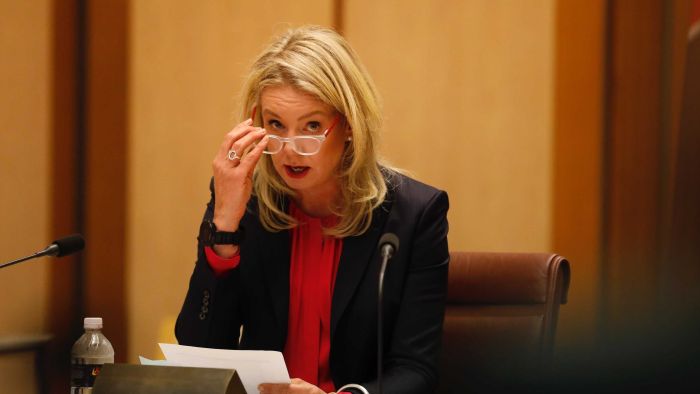Bridget McKenzie has defended a notorious sports grants program that cost her her ministerial career and insisted all decisions were her responsibility, not the Prime Minister’s.
Key points:
- Bridget McKenzie fronts a Senate inquiry into sports grants more than a year after losing her position as minister
- She rejects the Prime Minister’s Office had any involvement in changing projects she approved
- Senator McKenzie says she “assumes” someone in her office made changes without her knowing
An auditor-general’s report found marginal and targeted seats had been favoured to receive funding through the $100 million Community Sports Infrastructure Grant program in the lead-up to the 2019 election.
Senator McKenzie was the sports minister who oversaw the program at the time.
She later resigned from the Cabinet and her role as deputy leader of the Nationals after it was revealed she had failed to disclose her membership to a gun club which received almost $36,000 through the scheme.
More than a year later, she fronted a Senate inquiry into the administration of the grants and defended the fairness of the program.
She also insisted that while the Prime Minister had been consulted on the program, he did not make any decisions.
“The Prime Minister did not have a role in authorising projects during the three rounds of the program by Sport Australia and the final decision maker was me,” Senator McKenzie told the committee.
“I take responsibility for all the decisions made within this program.”
The Senate Committee heard 136 emails were sent between the Minister and Prime Minister’s offices.
This included a colour-coded spreadsheet, denoting which seats applications were in and the political party that represented them.
At one point in the hearing it was suggested the Prime Minister’s office had offered something to Senator McKenzie in exchange for taking the fall on the program.
“Come on, really?” she said, exasperated.
“No, not at all.”




Another point of contention was how a document listing the approved round three projects had been changed after Senator McKenzie had signed it and put it in her out tray.
She said she did that on April 4, 2019 but it was not ultimately processed until April 11, the day Mr Morrison called the federal election.
Senator McKenzie said she did not know who altered the document.
“I wasn’t in my office [when it was altered]. I put it in my out tray and went out the door,” she said.
“The estimates week of the 2nd of March 2020, it became clear the attachment to the brief had been altered after I signed that.
“The Prime Minister’s office was not responsible for altering the attachment to the round three brief, because the brief was submitted to Sport Australia … from my Ministerial office.”




Senator McKenzie said she has not investigated who altered that document.
“Changes were made without your knowledge, surely the inquisitive side of you would have gone, ‘I must find out who is responsible for that’?” Senator Anthony Chisholm asked.
“I was no longer the minister,” Senator McKenzie replied.
When Greens senator Janet Rice accused Senator McKenzie of “rorting” the program, she unsuccessfully attempted to have that comment withdrawn.
Earlier in the hearing, representatives from two unsuccessful clubs shared their experiences of the scheme.
Under Sport Australia’s system for allocating funds, clubs were given scores out of 100 for the merit of their application.
According to the auditor-general, a score of 74 was the cut-off for funding under that system.
Under intense questioning from Senator Eric Abetz, general manager of the Olympia Football Club in Tasmania Sarah Black expressed her disappointment to find out that clubs which had scored far lower than her own had received funding.
“You just need to remember we’re all volunteers as well,” she told the senator, who is also from Tasmania.
“We scored 79 … and to see that others projects that scored 40 or 50, which is half of our criteria which the assessment was based on [received funding].
“I understand it’s not all down to maths, but it shouldn’t be a huge component of difference.”
President of the Belconnen Tennis Club in Canberra, Martin Klein, said there should be more transparency in how grants programs operate.
“I think perhaps the governments of the day lose some credibility or standing within the community if they make decisions that aren’t transparent,” he said.
“They smell as bad as a rotten fish in some cases.”







